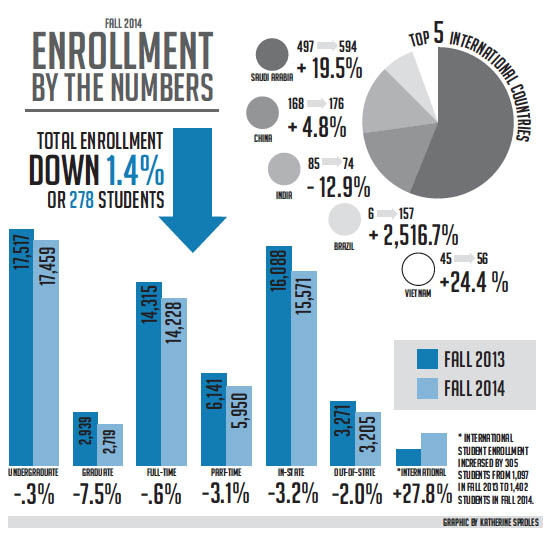Fall-to-fall student enrollment numbers decrease
December 4, 2014
WKU’s fall to fall enrollment is down for a second consecutive year. WKU’s enrollment for this semester is 20,178 students, down 278 students from the 20,456 students enrolled in fall 2013.
President Gary Ransdell said the enrollment drop resulted in a loss of $512,000 for the fall revenue target for enrollment.
“While that’s a significant number, it’s a manageable number,” he said. “The enrollment driven revenue certainly has our attention and we’re tracking it very closely and we have to have a balanced budget, and we will.”
Ransdell said money can be made up with one time carry-forward money that’s not part of the recurring budget.
Brian Meredith, chief enrollment and graduation officer, said he expected part-time student enrollment to decrease due to many of those students going back into the workforce. About 5,950 part-time students are enrolled, down 191 students from fall 2013.
Sharon Hunter, coordinator for College Readiness, and Meredith said there are many reasons for why students no longer choose to enroll at WKU, but the primary reasons are economic and personal.
Hunter said some students must drop out of school to take jobs to support their families.
“It’s a market driven economy,” she said.
Ransdell said that part-time students are not only in decline on WKU’s campus, but others as well.
He said part-time graduate student numbers are declining as well as many potential students are finding cheaper alternatives with other schools and programs, namely those going into teaching.
“We’re having a hard time competing in the marketplace with small, private institutions with a much lower price point and a less rigorous degree requirement,” he said.
Enrollment as a whole is down, but international student enrollment increased this semester. About 1,402 international students are enrolled at WKU, up 305 students from fall 2013. Saudi Arabia currently has the largest international student body on campus, with a total of 594 students enrolled. China follows with 176 and Brazil rocketed up to third with 157, up 151 students, or 2,516 percent, from last year.
“International students is a marketplace that we’re pursuing aggressively,” Ransdell said.
Raza Tiwana, chief international officer of global recruitment, said bringing these students stateside has involved communicating to these countries what WKU has to offer. He said many incoming Brazilians students have full ride scholarships through a Brazilian government program.
Ransdell said the university is working with several other countries to set up similar programs and increase international numbers. Next year, Tiwana said the university can expect an increase in students from the country of Oman.
Meredith said having a stable international student population is imperative to WKU’s student body as a whole.
“It’s a global society these days,” he said. “If we’re training and educating students to go out into the world, I think it is very enriching to have our international student population working and being in class with our domestic population. Both sides win in that relationship.”
Hunter and Meredith attributed the increase of international students to supportive federal governments abroad, word-of-mouth communication and WKU’s recruiting methods such as forming International Admissions, an office specifically devoted to enrolling international students.
“We’re not going to slow down there,” Meredith said. “We’re leaning in and putting a full throttle to international recruitment….”
Meredith is happy with the revamped recruiting process WKU has carried out in the past 18 months to improve future enrollment numbers for the fall of 2015 and 2016.
Meredith and team have worked with new tactics to appeal to prospective students. They’ve shown them examples of where WKU students work after they graduate and showcased WKU’s Honors College and study abroad programs.
Social media has also played a significant part in recruiting students, Meredith and Hunter said. For example, WKU uses Twitter to field questions from prospective students and have created groups on Facebook to connect students of the same graduating class with each other.
“A school that’s not embracing social media does so at their peril,” Meredith said.
Hunter said social media is useful, but is just a tool. Direct, personalized interaction with people makes a difference.
“Students recruiting other students is very powerful,” Meredith said.
Retention is also a factor in WKU’s enrollment. WKU’s current freshman to sophomore retention rate is about 73 percent, a number Meredith wants to improve to about 80 percent.
Ransdell echoed these sentiments.
“We’ve raised our admission standards,” Ransdell said. “Every point or half a point we raise our ACT score, we also find that there’s a correlation of a percent or two in our retention numbers.”
Meredith said the current first-time freshman class has an average ACT score of about 23.4 and an average GPA of about 3.33. He said an academically prepared freshman class usually improves university graduation and retention rate in the long term.
“This incoming class will drive that,” he said.
Meredith said WKU’s enrollment has been stagnant for the past two years, but is optimistic that it will improve in the future.
“WKU is turning a corner with its enrollment,” Meredith said.












![Students cheer for Senator at Large Jaden Marshall after being announced as the Intercultural Student Engagement Center Senator for the 24th Senate on Wednesday, April 17 in the Senate Chamber in DSU. Ive done everything in my power, Ive said it 100 times, to be for the students, Marshall said. So, not only to win, but to hear that reaction for me by the other students is just something that shows people actually care about me [and] really support me.](https://wkuherald.com/wp-content/uploads/2024/04/jadenmarshall-1200x844.jpg)




![Students cheer for Senator at Large Jaden Marshall after being announced as the Intercultural Student Engagement Center Senator for the 24th Senate on Wednesday, April 17 in the Senate Chamber in DSU. Ive done everything in my power, Ive said it 100 times, to be for the students, Marshall said. So, not only to win, but to hear that reaction for me by the other students is just something that shows people actually care about me [and] really support me.](https://wkuherald.com/wp-content/uploads/2024/04/jadenmarshall-600x422.jpg)








